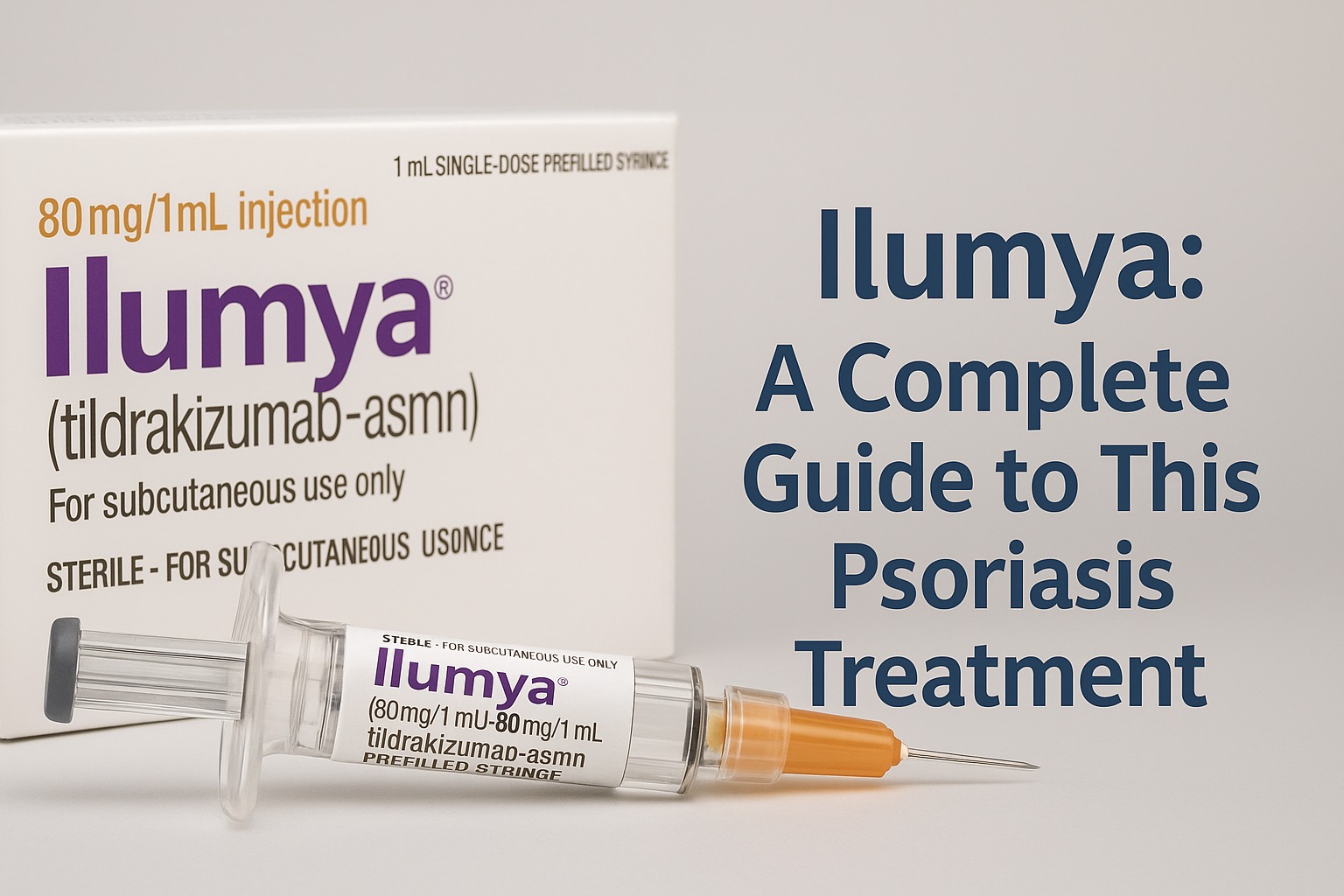Ilumya (tildrakizumab-asmn) is a prescription medicine used to treat moderate-to-severe plaque psoriasis in adults who are candidates for systemic therapy or phototherapy. It belongs to a class of drugs called monoclonal antibodies, which work by targeting specific proteins in the body that cause inflammation.
In this easy-to-read guide, you’ll learn what Ilumya is, how it works, when doctors prescribe it, how it’s given, possible side effects, precautions, and answers to some of the most common questions people search online.
Quick disclaimer: This article is for educational purposes only and not a substitute for professional medical advice. Always follow your dermatologist’s or healthcare provider’s instructions.
What is Ilumya?
Ilumya (tildrakizumab-asmn) is an injectable biologic medicine that helps control the symptoms of plaque psoriasis by blocking interleukin-23 (IL-23), a protein involved in inflammation. By reducing inflammation, Ilumya helps clear skin plaques, reduce redness and scaling, and improve quality of life.
Doctors prescribe Ilumya for adults with:
- Moderate-to-severe plaque psoriasis
- Psoriasis not well controlled with topical treatments or light therapy
- Patients who are suitable for systemic therapy (treatments that affect the whole body)
Warnings
Follow your doctor’s instructions carefully and read the medication guide provided with each injection.
- Infections: Ilumya may increase the risk of infections. Tell your doctor if you have a history of chronic infections or tuberculosis (TB). You may need a TB test before starting treatment.
- Do not receive live vaccines while on Ilumya.
- Tell your doctor if you are pregnant, planning pregnancy, or breastfeeding. The safety of Ilumya during pregnancy and breastfeeding is not fully known.
Before taking Ilumya
You should not use Ilumya if you are allergic to tildrakizumab or any ingredient in the injection.
Tell your doctor if you have ever had:
- Active or latent tuberculosis
- Repeated or chronic infections
- Any upcoming or recent vaccinations
How do I take Ilumya?
- Ilumya is given as a subcutaneous injection (under the skin) by a healthcare provider.
- The usual dosing schedule is:
- Initial dose at Week 0
- Second dose at Week 4
- Maintenance dose every 12 weeks after that
- Injections are usually given in the upper arms, thighs, or abdomen.
What happens if I miss a dose?
Contact your doctor if you miss an appointment for your injection. Your healthcare provider will help you get back on track with your dosing schedule.
What happens if I overdose?
Since Ilumya is given by a healthcare professional, the risk of overdose is extremely low.
What should I avoid while taking Ilumya?
- Avoid live vaccines during treatment.
- Do not start any new prescription or over-the-counter medicine without consulting your doctor.
What are the side effects of Ilumya?
Serious side effects (seek medical attention):
- Signs of infection (fever, chills, cough, shortness of breath, painful urination)
- Allergic reaction (rash, itching, swelling, dizziness, or difficulty breathing)
Common side effects include:
- Upper respiratory infections (common cold, sore throat)
- Injection site reactions (redness or pain)
- Diarrhea
- Headache
This is not a complete list. Report any unusual symptoms to your healthcare provider.
Storage
Ilumya is stored and handled by healthcare providers. Patients typically do not need to store the medication at home.
Popular FAQ
1. How long does Ilumya take to work?
Some patients notice improvement within weeks, but full results may take a few months of treatment.
2. Is Ilumya a cure for psoriasis?
No. Ilumya helps manage and control symptoms but does not cure psoriasis.
3. How often do I need Ilumya injections?
After the initial doses, you only need injections every 12 weeks.
4. Can I take Ilumya with other psoriasis medicines?
Your doctor will decide based on your overall treatment plan. Do not combine without medical advice.
5. Who should not use Ilumya?
People with severe infections, untreated tuberculosis, or known allergy to tildrakizumab should not use Ilumya.
Final Thoughts
Ilumya (tildrakizumab-asmn) is an effective treatment option for adults with moderate-to-severe plaque psoriasis. By targeting IL-23, it helps reduce inflammation and improve skin health. With its convenient dosing schedule of once every 12 weeks after the initial doses, Ilumya offers long-term relief for many patients.
If prescribed, follow your doctor’s guidance closely, report any side effects, and keep up with regular check-ups to ensure safe and effective treatment.


Excellent beat ! I would like to apprentice at the same time as you amend your site, how could i subscribe for a weblog web site? The account helped me a applicable deal. I had been a little bit acquainted of this your broadcast provided vibrant clear concept